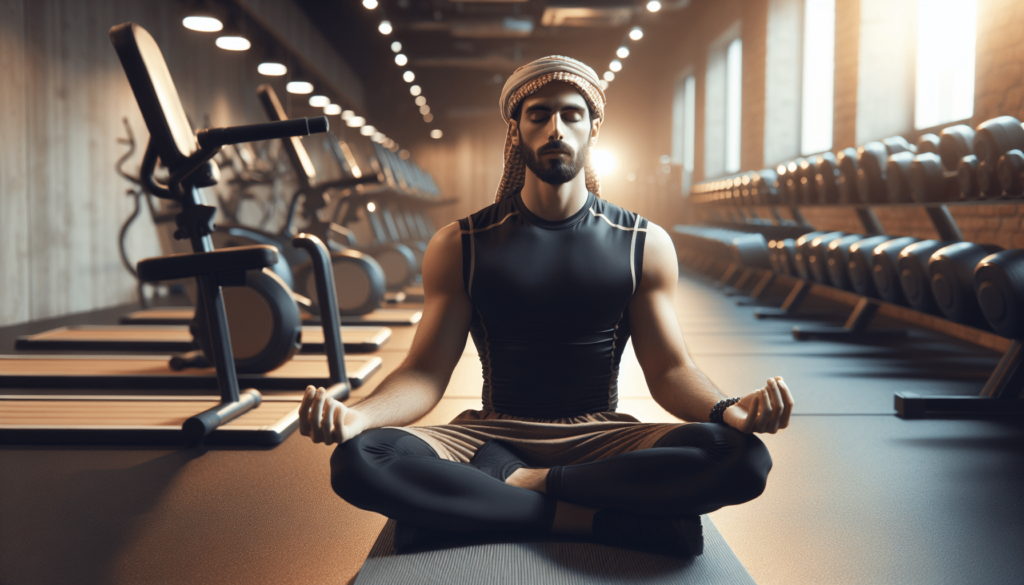Ever wondered why your mind feels lighter after a good workout? Or why your toughest days seem to shrink down a bit after you’ve broken a sweat? Well, my friend, grab your yoga mat and some kale chips because we’re about to have a chat about the big, chunky elephant in the room: mental health in fitness. I promise this will be informative, mildly entertaining, and definitely worth a read.

Mental Health: The Silent Workout Partner
You’ve got your gym schedule, your protein shake etiquette down to a science, and even your fancy fitness tracker. But what about the part of you that resides between your ears? Yeah, your noggin. Physical health and mental well-being are like the Batman and Robin of fitness. Let’s break down why your brain needs as much attention as your biceps.
Your Brain on Exercise: It’s Not All Endorphins
Why exactly does exercise make you feel better? “Endorphins!” You shout, clutching your running shoes like they’re made of gold. And while you’re not wrong, there’s a bit more going on upstairs when you get moving.
Exercise stimulates the production of neurochemicals such as endorphins, serotonin, and dopamine. Think of them as the superheroes fighting off the evil forces of stress and anxiety.
Why 30 Minutes of Sweating Trumps an Hour of Netflix
I know, I know. That new season of your favorite show is calling your name. But here are some stats to support trading in your remote for a set of dumbbells:
| Benefit | 30 Minutes of Exercise | 1 Hour of Netflix |
|---|---|---|
| Endorphin Boost | High | Low |
| Stress Reduction | Significant | Minimal |
| Mental Clarity | Enhanced | Decreased |
| Sleep Quality | Improved | Potentially Worse |
| Long-term Happiness | Increased | Dependent on Plot |
Communication skills sharpening aside, do you see the difference? Your workout isn’t just a physical regimen; it’s a mental health investment.
Stress: The Frenemy of Fitness
Stress can be as sneaky as that best friend who “borrows” your favorite book and never returns it. Here’s why it matters in your fitness journey.
The Biochemistry of an Existential Crisis
Cortisol, the stress hormone, is that annoying co-worker who always hangs around when you least want them. Excessive stress triggers this steroid hormone, and over time, elevated cortisol levels can lead to weight gain, disrupted sleep, and various mental health issues. In short, too much stress can turn your six-pack abs into a keg.
How to Box Your Stress Away (Not Literally, Unless You Like That Sort of Thing)
Cardio, weight lifting, yoga—pick your poison. Here’s how different types of exercise can help keep stress in check:
| Type of Exercise | Stress Reduction Mechanism |
|---|---|
| Cardio | Decreases cortisol, increases endorphins |
| Weight Lifting | Enhances mood through dopamine release |
| Yoga | Reduces anxiety via deep breathing |
| High-Intensity Interval Training (HIIT) | Quick endorphin burst, reduces stress fast |
Depression and Anxiety: The Unwanted Gym Buddies
If you’ve ever felt like a gloom cloud at the gym, you’re not alone. Depression and anxiety are the gate-crashers of your fitness party. But wait—there’s a life hack.
The Runner’s High: Myth or Reality?
Ever heard of the runner’s high? It sounds like an urban legend cooked up by marathon enthusiasts, but it’s very real.
When you engage in sustained physical activity, your body releases endorphins that create feelings of happiness and euphoria. This rush can alleviate symptoms of depression and anxiety, even if it’s a temporary fix.
More Than Just a Temporary Fix
Exercise offers long-term benefits too. Regular physical activity promotes new neuron growth and increases brain volume, particularly in areas linked to memory and emotional regulation. Basically, your brain becomes a well-oiled, neuron-producing machine. How cool is that?

Social Interaction: The Gym as Your Personal Cheers Bar
You know the theme song from Cheers, where “everybody knows your name”? Think of your fitness routine as your modern-day Cheers bar.
The Social Benefits of Group Exercise
Whether it’s Zumba, CrossFit, or your twice-weekly spin class, communal sweat sessions have social perks. Let’s break this down:
| Benefit | Description |
|---|---|
| Sense of Community | Feeling part of a group combats loneliness |
| Team Motivation | Peer encouragement enhances performance |
| Accountability | Harder to skip a class when friends are waiting |
| New Friendships | Shared goals create bonds |
Your mental health isn’t just getting a boost from all those endorphins; it’s also benefiting from social connections. Who knew?
Digital Communities: Because the Internet Can’t Be All Bad
Can’t find a local group to join? No problem. Digital communities—think fitness forums, social media groups, or virtual challenges—can offer similar benefits. You get motivation and support without leaving your couch. Perfect for those of us who find human interaction mildly terrifying.
Sleep: The Unsung Hero of Mental and Physical Fitness
Ah, sleep. That magical state where we’re blissfully unaware of email notifications. But did you know it’s not just a recovery period for your muscles but also for your brain?
The Vicious Cycle of Sleep and Mental Health
Poor sleep can lead to stress and anxiety, which can lead to—you guessed it—poor sleep. It’s a loop more vicious than a cat protecting its favorite piece of string.
Here’s a quick cheat sheet on why sleep matters:
| Lack of Sleep Consequence | Mental Health Result |
|---|---|
| Increased Cortisol Levels | Higher stress and anxiety |
| Impaired Cognitive Function | Reduced focus and clarity |
| Altered Mood Regulation | Increased irritability |
| Disrupted Neurotransmitter Production | Worsening depression and anxiety |
Bedtime Workout: The DOs and DON’Ts
- DO a short 10-15 minute light exercise like stretching or yoga to help calm the mind before bed.
- DON’T do vigorous exercise right before sleep. Stick to low-intensity activities that promote relaxation, not CrossFit.
Eating: Not Just for Gains, But for Brains
Your diet impacts your mental health, which in turn impacts your fitness. Yes, it’s an intricate web.
The Brain-Gut Dynamic Duo
Your digestive system and brain are in constant communication through the gut-brain axis. Here’s the lowdown:
| Food Type | Effect on Mental Health |
|---|---|
| Omega-3 Fatty Acids (e.g., fish) | Enhances mood, reduces anxiety |
| Antioxidants (e.g., berries) | Protect from oxidative stress |
| Complex Carbs (e.g., whole grains) | Stabilizes blood sugar, improves focus |
| Probiotics (e.g., yogurt) | Enhances gut health, reduces anxiety |
Sugar: The Snarky Saboteur
Consuming an excess of sugar can leave you feeling more like Sad Sack than Superman. High sugar levels can impact your brain function over time. So, while that double mocha frappe might make you momentarily happy, it’s not doing your brain any long-term favors.
Practical Tips: Making Mental Health a Fitness Priority
Routine-ize It
Just as you schedule your leg day (or conveniently dodge it), pencil in time for mental health activities. Meditation, deep breathing, or even a five-minute gratitude practice can make a world of difference.
Seek Professional Help If Needed
Let’s not sugarcoat it—sometimes exercise alone isn’t enough. Therapy or counseling can be an invaluable addition to your mental fitness plan. Think of a therapist as your mental personal trainer.
Make It a Habit
You wouldn’t expect to see abs after one sit-up, right? Mental health improvements take time. Be patient, and remember: slow progress is still progress.
Mental Health Checklists: Your Fitness Compass
Finally, let’s put everything into a quick-go list for your mental well-being. Feel free to print it out, tattoo it on your forearm, or casually drop it into conversations at parties.
Daily Mental Health Checklists
- Morning Routine: Start with a mindfulness practice like meditation or journaling.
- Diet: Incorporate foods that benefit your brain and mood.
- Exercise: 30 minutes of any physical activity. Remember, consistency is key!
- Evening Routine: Wind down with light stretching or reading a book.
Weekly Mental Health Checklists
- Social Interactions: Attend a fitness class or group every week to foster community.
- Therapy: If needed, schedule a session with your therapist or counselor.
- Sleep: Aim for 7-9 hours each night. Quality over quantity.
Wrapping Up: The Mental-Physical Fitness Relationship
You’ve now got a solid understanding of why mental health is just as crucial as lifting heavy things and putting them back down again. So next time you think about skipping out on your spin class or ignoring your mental health in favor of binging TV shows, remember: you’re doing both your body and mind a disservice.
By integrating physical activity with psychological well-being, you’re not just building muscles—you’re fortifying your entire being.
So go ahead, lace up those running shoes, and conquer both your physical and mental fitness goals. Just remember to leave some time for a mindful moment or two. Your brain (and perhaps even your abs) will thank you.
Now, where did I put those kale chips?
